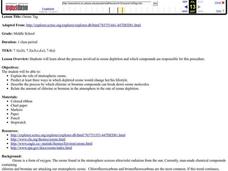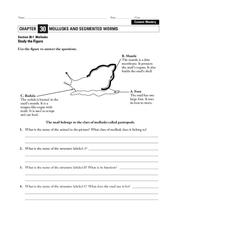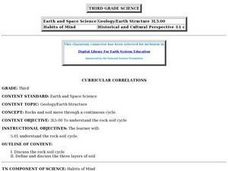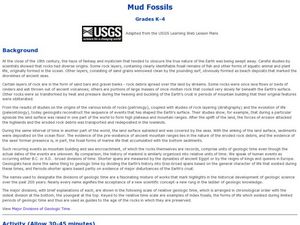Curated OER
Rocks, Minerals, and Erosion
Students identify and describe rocks that contain records of the earth's history and explain how they were formed. They formulate questions about and identify needs and problems related to objects and events in the environment, and...
Curated OER
Stressed to a Fault!
Eighth graders describe how stress builds up in the Earth's crust by the movement of tectonic plates. In groups, they relate the three types of stresses to the types of plate movements and explain how the stress causes faults to form. ...
Curated OER
Plate Tectonics
In this science activity, students use basic scientific concepts to complete the series of puzzles that are intended to increase science literacy and focusing upon plate tectonics.
Curated OER
Aquifers and Groundwater
Students understand the purpose of an aquifer. For this aquifer and groundwater lesson, students build a model aquifer find its relationship to water usage. Students record observations as they build the layers of the aquifer.
Curated OER
Science Word Search
In this science learning exercise, middle schoolers look for the words that are related to the theme of the sheet in the word search. They also work on spelling skills.
Curated OER
Coal: More Than Meets the Eye!
Students participate in a hands-on simulation to help them explain that coal resources are deposited unevenly between the earth's surface and under the ground.
Curated OER
Natural Vegetation
In this earth science worksheet, students identify and locate various vocabulary terms related to natural vegetation. There are 21 earth science terms located in the word search.
Curated OER
Do Some Research: Science 1
In this science research worksheet, students read the sentence and use a library or the Internet to find the answer and write it on the blue line. Students must then write a report about this topic: what is the layer of air that...
Curated OER
Ozone Tag
Seventh graders explain the role of stratospheric ozone and predict at least three ways in which depleted ozone would change her/his lifestyle. They then describe the process by which chlorine or bromine compounds can break down ozone...
Curated OER
Geologic Age
Students investigate rocks. In this geologic age lesson, students conduct an experiment to determine absolute age as one would for rock layers. Students graph data and problem solve using results.
Project SMART
Rocks and Minerals: Touch the Earth
Students complete a unit of lessons on rocks and minerals. They conduct research, write e-mail questions to geologists, write daily journal entries, label maps demonstrating types of rocks/minerals found, and create a web page that...
Curated OER
Your Own Backyard
Pupils study Earth's features and their local environments. In this Earth's features lesson, students take a field trip to observe a natural environment and pupils sketch their observations of the nature. Students watch videos about...
Curated OER
Investigating the Soil
Students explore the Earth's crust by researching pH levels and acidity. In this environmental safety lesson, students identify the pros and cons of acidity within soil and how it affects plants. Students collaborate in a pH level...
Curated OER
Stratospheric Ozone
Students explore about the structure of Earth's atmosphere and about the stratospheric ozone. They discuss how it is produced and destroyed, where it is located, why it is important, and how it is changing. Students investigate about...
Curated OER
Mollusks
In this mollusks worksheet, high schoolers use an illustration of a snail to complete 4 short answer questions about the structure and function of the parts of gastropods.
Curated OER
Interior of the Earth
Sixth graders identify and describe the composition and physical properties of the layers of the Earth. They also explain how scientists used the scientific process to know about the center of the Earth. Finally, 6th graders read a...
Curated OER
Geology/Earth Structure
Third graders examine the rock-soil cycle. They identify the steps and describe what happens. They also discover the three layers of soil.
Curated OER
Solid Earth Socratic Questions
Learners participate in a whole class discussion to relate what they know about earthquakes to the processes of plate tectonics. They respond to prompts that lead them to conclusions about the layers of the earth.
Science Matters
Earthquakes and Volcanoes Post Assessment
The final lesson in the 20-part series is a post assessment covering earthquakes and volcanoes. Twenty-three questions incorporate each of the previous lessons through multiple choice, justified multiple choice, expanded multiple choice,...
Teach Engineering
Skin and the Effects of Ultraviolet Radiation
Though UV radiation can damage skin, it isn't all bad. The third installment in a six-part series allows the class to study the structure and function of skin. They learn about the different types of skin cancer and the SPF rating...
American Museum of Natural History
Journey to the Stars
Fifteen detailed pictures and informative captions delve deep into the exploration of stars—their life cycle and importance in the universe.
Curated OER
Mud Fossils
Students observe real fossils. In this science lesson, students make their own mud fossils by pressing material into the mud and letting it dry in the sun for 3-4 days. Students then get the fossils out displaying their mud...
Curated OER
Graham Cracker Plate Tectonics
In this plate tectonics worksheet, students use Graham crackers, frosting, water and a paper plate to simulate tectonic processes such as convergent, divergent and transforming plate boundaries.
Curated OER
Deep Thoughts
Learners examine what lies within the Earth. They research and create scale models illustrating the layers of the Earth and write skits advocating a travel plan to send a probe into the Earth's mantle.
Other popular searches
- Science Earth Layers
- Earth Science Earth's Layers
- Earth Science Earth Layer
- Science Layers of the Earth
























